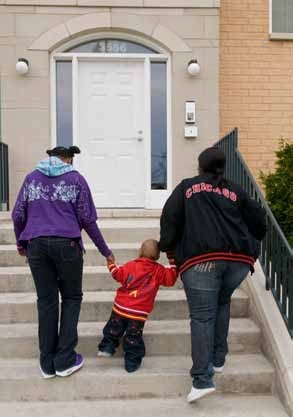In fall 2014 Cuyahoga County launched the country’s first county-level Pay For Success initiative. Informed by our analysis of data from our CHILD integrated system, project partners decided to focus the project on reducing foster care stays for children whose families experience homelessness. The Poverty Center will evaluate the initiative’s progress and success over a five year period.
Articles on Pay for Success
- $5M Ohio ‘Pay For Success’ Targets Homelessness And Child Welfare
- Cuyahoga County Partnering for Family Success Programs.
2020 Report on Cuyahoga Partnering for Family Success Process Evaluation
The Center on Urban Poverty & Community Development issued its final report on the Cuyahoga County Partnering for Family Success (PFS) program in February 2020. This five- year study, using a randomized control trial, examined the effects of specialized intervention for housing unstable families with a child in out-of-home placement. Over the course of the project, the study enrolled 273 housing unstable caregivers who had a total of 540 children in out-of- home placement (OHP). Using a sequential random assignment procedure, the caregivers were assigned to either receive conventional services from DCFS (Control: 138 caregivers, 261 children) or DCFS services coupled with the PFS intervention (Treatment: 135 caregivers, 279 children). The study showed that though lengths of stay in care were similar in the two groups, the intervention was more likely to result in children from African-American families being reunified with their family, as compared to similar families who received conventional services.
Report on Cuyahoga Partnering for Family Success Process Evaluation
Jul 27 2017
The Poverty Center has released its first Briefly Stated report of the year on the process evaluation of the first two years of Partnering for Family Success (PFS), a five-year randomized control study underway in Cuyahoga County, Ohio. The program is a partnership between FrontLine Service, Cuyahoga County Division of Children and Family Services, Ohio Department of Jobs and Family Services, Cuyahoga Metropolitan Housing Authority, the Domestic Violence and Child Advocacy Center, and Enterprise Community Partners, Inc.
Using the evidence-based Critical Time Intervention framework, and focusing on homeless caregivers with children in out-of-home placement (OHP), the PFS program seeks to safely reduce the number of days that children spend in OHP. The overall program goal is to safely reunite families quickly by providing families with housing, and offering supportive services, using avoided foster care costs to serve families more effectively. Data from multiple sources indicated that the PFS program helps to stabilize families in the treatment group through providing housing and increased levels of public assistance. Treatment group families also show less involvement with child welfare and decrease their contacts with case management services over time. However, clients’ experiences with domestic violence and service coordination across agencies were identified as important challenges.
Download the Briefly Stated report.
The report was authored by Rong Bai, MSSA, MNO, Cyleste C. Collins, Ph.D., David Crampton, Ph.D., Chun Liu, MSSA and Rob Fischer, Ph.D.
The report’s authors appreciate the assistance of Brianna Andrie who conducted two of the interviews. Dana Santo of FrontLine Service, and Karen Anderson at DCFS helped to arrange the interviews. Poverty Center researchers Tsui Chan, Marci Blue, and Nina Lalich assisted with and/or conducted the analyses.
Poverty Center at the 2017 Society for Social Work and Research Conference
Jan 9 2017
Several faculty and students from the Center of Urban Poverty and Community Development will be attending and presenting at the 21st annual conference of the Society for Social Work and Research (SSWR) in New Orleans this week.
- Dr. Claudia Coulton, co-director, and Dr. David Crampton, associate director, will be participating in the round table discussion Advancing the Impact of Ecologically Oriented Research on Child Maltreatment Prevention on Friday, January 13.
- Recent Poverty Center faculty associate Dr. Cyleste Collins presents Bridging the Gap Between Researchers and “Regular People:” Building Research Capacity in Community Organizations on Friday as well.
- Rong Bai, a doctoral student research assistant at the Center, is the presenting author on the ePoster Evaluating the Implementation of Partnering for Family Success on Saturday, January 14. The other authors on the poster are Dr. Collins, Dr. Crampton, and Center co-director Dr. Robert Fischer.
- Also on Saturday, Dr. Coulton is presenting Temporal Effects of Distressed Housing on Child Maltreatment Among Young Children; Poverty Center doctoral assistant Youngmin Cho, faculty associate Dr. Francisca Richter, and Dr. Fischer are also authors.
- 2007 research by Dr. Coulton and others from the Center is being cited in another child maltreatment panel presented by faculty from the University of Southern California and New Mexico State University on Friday.


